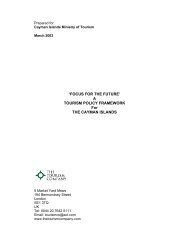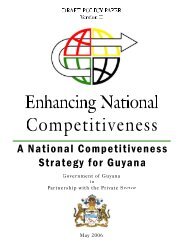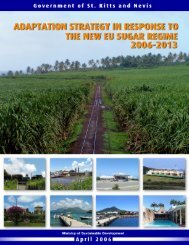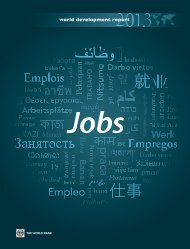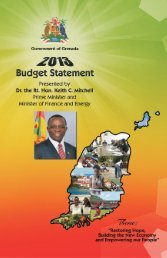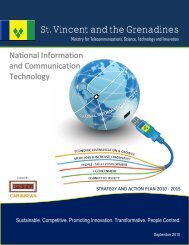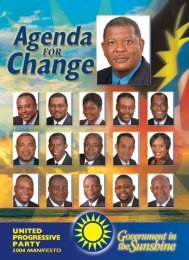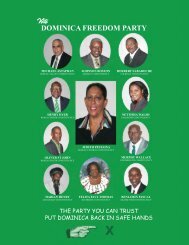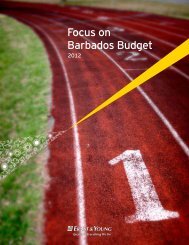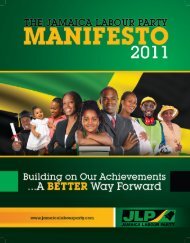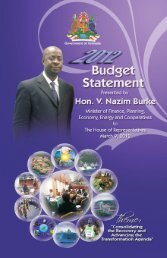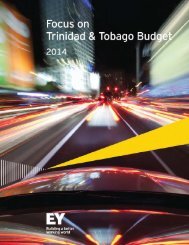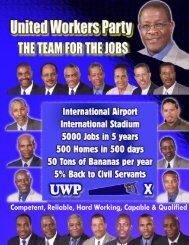Business Removing
Doing Business in 2005 -- Removing Obstacles to Growth
Doing Business in 2005 -- Removing Obstacles to Growth
- No tags were found...
Create successful ePaper yourself
Turn your PDF publications into a flip-book with our unique Google optimized e-Paper software.
52 DOING BUSINESS IN 2005<br />
• In 2003 Unefon, the cellphone unit of the Mexican<br />
broadcaster TV Azteca, was at risk of defaulting<br />
on a $325 million loan from its biggest creditor, Nortel.<br />
Nortel sold the debt to a private company, Codisco Investments,<br />
at a steep discount, for $107 million. Four<br />
months later, Unefon paid back the full $325 million<br />
debt. Codisco netted $218 million. But TV Azteca neglected<br />
to tell investors that half of Codisco was owned<br />
by its controlling shareholder. 14<br />
• In 2003 Italian dairy-foods giant Parmalat defaulted<br />
on a $185 million loan, prompting auditors to inspect financial<br />
statements. It turned out accounts were falsified<br />
to hide $10 billion in losses and $620 million misappropriated<br />
to other family owned companies. More than $9<br />
billion of Parmlat’s reported assets could not be traced. 15<br />
FIGURE 7.3<br />
Rich countries disclose the most<br />
Disclosure index<br />
GREATER<br />
DISCLOSURE<br />
Source: Doing <strong>Business</strong> database.<br />
5.5 OECD high income<br />
3.9 East Asia & the Pacific<br />
3.6 Europe & Central Asia<br />
3.2 South Asia<br />
2.6 Middle East & North Africa<br />
2.4 Sub-Saharan Africa<br />
2.3 Latin America & the Caribbean<br />
5.3 Rich<br />
3.7 Middle income<br />
2.6 Poor<br />
The common element in these cases: a lack of disclosure.<br />
None of the controlling shareholders informed<br />
minority investors of their ownership in related companies.<br />
This is legal in many countries. In Mexico, Russia<br />
and 70 other countries neither the corporate law nor the<br />
securities law required such disclosure. An external audit<br />
finally caught the Parmalat scandal, but managers were<br />
able to simply invent assets for 15 years without close<br />
scrutiny from audit committees. In Turkey and 67 other<br />
countries, the combination of both internal audit committees<br />
and external audits to catch and disclose such<br />
behavior is not required.<br />
Canada, Israel, Spain, the United Kingdom and the<br />
United States have the most disclosure requirements of<br />
any country (table 7.2). Rich countries mandate much<br />
higher disclosure than do developing countries. East<br />
Asia has the most disclosure of any developing region.<br />
Latin America has the least (figure 7.3).<br />
TABLE 7.2<br />
Rich countries disclose the most<br />
Most Disclosure Index Index<br />
Canada 7 Japan 6<br />
Israel 7 Korea, Rep. 6<br />
Spain 7 Lithuania 6<br />
United Kingdom 7 Nigeria 6<br />
United States 7 Philippines 6<br />
Australia 6 Slovakia 6<br />
Austria 6 South Africa 6<br />
Chile 6 Sweden 6<br />
Czech Republic 6 Taiwan, China 6<br />
France 6 Thailand 6<br />
Hong Kong, China 6 Tunisia 6<br />
Ireland 6 Zimbabwe 6<br />
Source: Doing <strong>Business</strong> database.<br />
These indicators come from a new survey of corporate<br />
and securities lawyers. 16 The data measure the most<br />
stringent level of required disclosure, reflecting the<br />
choices of small investors to put their money in publicly<br />
listed or privately held companies. In countries where<br />
stock exchange regulations and securities laws are in<br />
force, the disclosure index assesses these regulations. In<br />
other countries, the disclosure requirements come from<br />
the company law. So the indicators are relevant for private<br />
companies as well as publicly listed ones.<br />
Disclosure of ownership shows who has enough<br />
power to appoint managers and determine business<br />
strategy. If an investor illicitly gains control of the business,<br />
he may expropriate the investments of small shareholders<br />
and do so legally by voting for transactions that<br />
benefit him at the expense of others. Four types of ownership<br />
disclosure reduce this possibility: information on<br />
family, indirect or beneficial ownership, and on voting<br />
agreements between shareholders.<br />
Family ownership. First, investors would like to know<br />
whether a large shareholder expands his control of the<br />
business when another member of his family buys shares.<br />
Some countries—such as Canada, Japan, and Norway—<br />
mandate disclosure of ownership by immediate family<br />
members. Others go further. The Czech Republic requires<br />
disclosure for “any related person.” Still others impose<br />
no requirements whatsoever, including such rich<br />
countries as Germany and Italy, as well as middle income<br />
ones as Egypt.<br />
Indirect ownership. A second disclosure that benefits<br />
small investors is that of indirect ownership. Yoshisuke<br />
Aikawa, the founder of Nissan, describes a classic example.<br />
Consider a wealthy Japanese family that establishes<br />
a business, Choten Corp, with ¥1 billion. 17 The family



